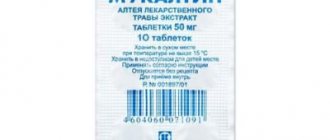Cough is a symptom of many diseases - colds, ARVI, bronchitis and others. It causes discomfort to any person, and especially to expectant mothers. A pregnant woman can get sick at any stage, and especially in the first trimester, since the immune system is very weakened. Therefore, with any slightest contact with sick persons who outwardly seem healthy or hypothermia, there is a risk of its occurrence.
It is important to take into account that cough itself is not a disease, but a manifestation of it. This is a reflex reaction of the body, which helps the airways to clear the pathological secretions that accumulate in the lower respiratory tract. Therefore, it is not this symptom that needs to be treated, but the disease that caused it. In some cases, cough occurs as a result of an allergic reaction to a particular irritant.
What expectorant and antitussive syrups are allowed for pregnant women?
On the shelves of pharmacies you can find many cough medications in various forms (tablets, syrups). But not all of them are allowed for pregnant women. How do you know whether you can take the drug during pregnancy or not? The instructions will help with this. Indications, side effects, and so on are always indicated there.
The most reliable way is to buy on the advice of a doctor. Self-prescription can harm the expectant mother and child. In addition, some products contain substances that intensify cough (to remove phlegm), they act on the abdominal cavity.
It is necessary to take into account that if the expectant mother takes a certain drug, but there is no effect from it, perhaps the drug is not suitable or it is addictive. The product should be replaced with another one.
What drugs are prohibited?
It is not recommended to take:
- "Ascoril", "Tussamag" and others. "Ascoril" has a lot of side effects.
- "ACC" and the like ("Bronchobos", "Fluimucil") affect digestion and the heart.
- Medicines containing codeine.
- Alcohol syrups.
Medicines should not contain:
Attention! Most medications contain sugar, so they should not be taken if you have diabetes.
Effective remedies in the 1st, 2nd, 3rd trimester of pregnancy
Table with an approximate list of drugs allowed in the 1st, 2nd, 3rd trimesters:
| Trimester | Name | Description | Average cost (in rubles) |
| 1st | "Stodal" | This drug:
| 250 |
| 2nd | "Doctor MOM" | Syrup:
| 180 |
| "Lazolvan" | The product should be used with caution | 190 | |
| "Doctor Theiss" | Syrup:
| From 180 | |
| "Gerbion" | Medicinal product:
| 250 | |
| 3rd | "Stoptussin" | The syrup is suitable for the treatment of bronchitis and tracheitis | 210 |
| "Marshmallow Root" | The product smells pleasantly of herbs | 30 | |
| "Flavamed" | The medicine has a raspberry flavor | 165 |
Effective drugs
There are a number of medications that can be used during pregnancy.
Stodal
This homeopathic cough syrup can be used at different stages of pregnancy. It contains up to 10 natural ingredients and helps cope with different types of cough. The only contraindication to the use of the substance is considered individual intolerance.
Doctor Mom
This substance (syrup) can be used in the 2nd trimester of pregnancy. It includes 10 components and has a pleasant taste. The product helps remove phlegm. This can be achieved by dilating the bronchi and thinning the mucus. The substance also reduces inflammation.
Lazolvan
Doctors recommend using Lazolvan syrup during pregnancy with great caution. This can be done as prescribed by a doctor, starting from the 2nd trimester.
In the initial stages, the substance is contraindicated.
Dr. Theiss
This product has a pleasant minty taste. It can be used for any diseases that are accompanied by difficult to separate sputum. Side effects include the risk of allergies.
Gerbion
Herbion contains extracts of plantain and mallow flowers. The product stops inflammation, copes with microbes, and thins sputum. The composition can be used for different types of cough.
Stoptussin
The product includes plant extracts - plantain, thyme, thyme. The composition suppresses the activity of the cough center and helps cope with dry cough. The medicine is used to eliminate bronchitis and tracheitis. Side effects include allergies.
Marshmallow root
This is another herbal medicine that has a pleasant taste and aroma. The composition contains pectins. These substances thin and remove mucus. Side effects include allergies.
Flavamed
The composition can be used for wet cough. The product contains ambroxol, which has expectorant properties and relieves inflammation. The product has a raspberry flavor. It helps to liquefy mucus and facilitates its removal.
Syrups for wet cough: indications and contraindications
A wet cough can bother you for a long time. Sometimes it becomes permanent due to viscous sputum, which is difficult to separate. The expectant mother needs to quickly free the bronchi from such sputum in order to prevent a constant flow.
Medicines for such a cough make the sputum thin, so they should be taken if there is viscous sputum. Products are prohibited in case of hypersensitivity to the components.
"Doctor Theiss": instructions for use
The manufacturer produces the drug in the form of syrup:
- Ordinary.
- No sugar content.
- To be taken before bed (at night) - ensures breathing throughout the night.
For cough there are forms of release of the drug in the form:
- Ointments with eucalyptus for external use and inhalation.
- Solution for oral use (“Bronchosept”).
- Lollipops with honey and plantain.
- Capsules with anise oil.
The syrup is well tolerated by pregnant women due to its natural ingredients, but in rare cases allergies may occur.
Advantages of the product:
- It has a mild action and high efficiency.
- The manufacturer produces a form of night syrup that makes breathing easier.
- Economical consumption.
- There is a low chance of allergies.
- The usual syrup form contains sugar.
"Bromhexine"
The drug contains bromhexine, which is a synthetic substance. The product can be used from the 2nd trimester.
Advantages of the drug:
- It works quickly.
- Inexpensive cost.
- A measuring spoon comes with the syrup.
Disadvantages of Bronhexine:
- Many people complain about the bitter taste.
- Can cause allergies.
How else can you treat cough in pregnant women?
To treat cough, in addition to medications, you can use the following methods:
1. Folk remedies, several recipes:
- Honey is an effective cough remedy during pregnancy. The product soothes the throat, thereby helping to cope with sore throat. To prepare the solution you will need 1 tbsp. honey and 1 glass of warm water. You should mix everything and take it before bed and in the morning before meals.
- Lemon . Citrus fruits contain a lot of vitamin C, which fights the virus during colds. If the expectant mother has a cough, lemon juice should be mixed with warm water. You can add 1 tsp to this solution. honey.
- Onion syrup . You will need 1 onion, which needs to be finely chopped or grated. Take 3 tbsp. sugar, mix everything. Let it brew for 24 hours, take 2 tablespoons of syrup. 1 per day.
- Aloe juice can be mixed with lemon and honey.
- Milk . Add 1 tbsp to a glass of milk. honey, heat everything up.
- for coughs include chamomile, sage, mint. You can brew one thing or make a collection at once.
2. Inhalations:
- This method is only suitable if there is no temperature (up to 37 degrees). Inhalations should be done 2-3 times a day for 10-15 minutes.
- Potatoes should be boiled in their skins (5-6 pcs.). You should wait so that the steam is not hot, otherwise you may burn your face.
- From herbs. You can use linden, sage, chamomile.
The most effective remedies, according to doctors
According to doctors, the safest method is folk remedies. There are no additives, flavors or preservatives in the plants. The advantage of the method is accessibility. Not every person can afford to buy an expensive drug.
If traditional methods are not effective, syrups are suitable for treatment:
- "Doctor Theiss." The drug has different syrup forms. For example, if you have diabetes, you can choose the “sugar-free” form. A night syrup is produced that makes breathing easier at night.
- "Gerbion" is a safe herbal medicine.
- "Marshmallow root."
- "Travisil."
- "Fluifort."
- "Gedelix".
- "Bronchostop".
- "Stoptussin."
In most cases, syrups contain sugar, so these products are not suitable for people with diabetes. Some preparations contain dyes, flavors, and alcohol. For example, in Prospana, sugar is replaced with fructose, so it can be taken for diabetes, but contains flavorings.
An expectant mother should always take care of her health and treat diseases in a timely manner. In case of a cold, when a cough cannot be avoided, it is still better to consult a therapist. The doctor will prescribe the safest remedy, be it traditional medicine or cough syrup for pregnant women. Even drugs that are approved according to the instructions for pregnant women should not be taken without a prescription.
Article design: Oleg Lozinsky
Use of pharmaceutical drugs
If the listed remedies turn out to be ineffective, you have to use pharmaceutical drugs. At the same time, it is worth choosing those that do not contain alcohol (or contain it in minimal quantities), on a natural basis. In the first trimester, you can use drugs in different forms of release - syrups, lozenges and lozenges, tablets. But only a doctor should prescribe the drug, taking into account all possible risks.
In the first trimester of pregnancy, if other treatment methods cannot be used, you can use pharmaceutical products:
- Mucaltin is a plant-based tablet preparation;
- Marshmallow root syrup or dry cough syrup during pregnancy in the 1st trimester;
- Bronchipret in tablets or syrup (contains alcohol, but a minimal amount);
- Herbion in lozenges or syrup;
- Ambroxol;
- Syrup Stodal.
How can you treat a cough in the second trimester?
The second trimester of pregnancy is considered relatively “quiet”.
Unfortunately, a woman’s weakened immunity often leads to the development of various colds, causing coughing of varying intensity. Treating cough during pregnancy in the 2nd trimester is a little easier than in the first, but this can only be done under the supervision of your doctor. Pregnant women in the 2nd trimester cannot decide on their own what to use for a cough. The risk of harming your health or that of your baby is quite high. This is due to the importance of diagnosis - establishing the cause of cough is mandatory, since it can serve not only as a sign of mild inflammation of the respiratory tract, but also of severe infectious diseases. They, in turn, can provoke abnormalities in the development of the child and cause miscarriage. You need to understand that any cough medicine during pregnancy in the 2nd trimester can have a teratogenic effect. Therefore, before treating cough in pregnant women in the 2nd trimester, it is necessary to consult a doctor and conduct diagnostics.
How does the treatment of cough in the 2nd trimester differ from its treatment during other periods of pregnancy?
Many women have heard that in the second trimester there is practically no threat to the fetus. This is far from true. It, of course, is already reliably protected by the placenta, which is a fairly reliable barrier from substances undesirable for the child, but some cough pills during pregnancy in the 2nd trimester can easily overcome it.
By the way, the inflammatory process itself (a cold), in the absence of proper treatment, can cause fetoplacental insufficiency - a disruption in the processes of feeding the fetus and supplying it with oxygen often provokes premature birth. A mother's cold in the 2nd trimester is dangerous due to improper formation of fetal bone tissue, as well as congenital pathologies of the endocrine system. The doctor prescribes cough medications during pregnancy in the 2nd trimester only after assessing the current condition of the mother, and only by balancing the expected benefits and risks for the baby.
Unlike the first trimester, the list of approved drugs and dosage forms acceptable for use in the second trimester is wider. Doctors often recommend supplementing or even starting treatment with folk remedies, as well as some homeopathic remedies, which are strictly prohibited at the very beginning of pregnancy. It becomes possible to use inhalations and compresses. It is advisable to use mild immunostimulants, since the immunity of expectant mothers is sufficiently weakened.
The danger of the cough reflex
Due to the fact that the cough reflex is a harbinger of a disease of the respiratory system of a viral or bacterial nature, the lack of timely and necessary treatment poses a danger to both the expectant mother and the child. It poses a real threat to pregnancy: it increases the risk of intrauterine infection, premature birth, miscarriage, and pathologies of fetal formation.
The cough reflex itself increases the tone of the uterus, thereby creating a dangerous condition leading to miscarriage and the development of hypoxia. For women with a low degree of placentation or abnormal placenta previa, the cough reflex due to the presence of muscle tension creates conditions for the development of uterine bleeding.
A severe cough during pregnancy is accompanied by paroxysmal nausea and complicates the course of toxicosis, if any.
What immunomodulators are possible in the 2nd trimester of pregnancy
Frequent colds in expectant mothers are explained by a pronounced decrease in the body's defenses. There is not enough immunity for two, so doctors often prescribe immunostimulating drugs to such patients.
As practice shows, any cough medicine for pregnant women in the 2nd trimester, enhanced with an immunomodulator, turns out to be several times more effective and faster - this is an important point, since a strong cough can provoke a miscarriage.
The list of approved drugs is determined by a specialist, and only he decides what is available for cough during pregnancy in the 2nd trimester.
Most believe that herbal stimulants are safe and expectant mothers can take them without restrictions - this is not true. Herbal immune stimulants such as eleutherococcus, lemongrass or ginseng are strictly contraindicated for pregnant women. They often cause surges in blood pressure, tachycardia, insomnia and severe allergic reactions.
Synthetic immunomodulators may not have a negative effect on the child, but research in this area is very expensive. Many manufacturers prefer not to carry them out, mentioning in the instructions that these drugs are contraindicated during pregnancy. Among the approved immunostimulants often prescribed to expectant mothers, several drugs can be noted.
Viferon
Combining immunostimulating and antiviral effects, it can be prescribed from the 14th week. It can also be used during lactation - safety has been confirmed by clinical studies. The dosage of the drug is prescribed by the doctor, based on the patient’s current condition and the degree of immune suppression. Viferon is often used for prophylactic purposes.
Limontar
This remedy belongs to the general strengthening means. It contains two active components - succinic and citric acids. The drug increases the body's nonspecific reactivity, improves adaptation and compensatory capabilities.
Beresh plus
Available in the form of drops with immunostimulating, metabolic and tonic effects. They not only perfectly complement cough medicine during pregnancy in the 2nd trimester, but also replenish existing deficiencies of macro- and microelements, and help restore mineral metabolism, including in cases of unbalanced nutrition. The drops help restore appetite, eliminate insomnia and increased fatigue, and normalize the emotional background.
Cough tablets during pregnancy 2nd trimester of pregnancy
The question of how to treat a dry cough during pregnancy in the 2nd trimester is not an easy one even for a doctor. Not all pills can be used by expectant mothers. The doctor prescribes the drug according to the severity of the condition and the type of cough. The list of cough tablets for pregnant women in the second trimester is not so long.
Mukaltin
This is an inexpensive and effective expectorant, the active ingredient of which is marshmallow extract. The action of the drug is realized through two mechanisms.
- Stimulation of the bronchial glands that produce mucous secretion, which leads to the liquefaction of sticky and excessively viscous sputum.
- The activity of the ciliated epithelium is stimulated, which leads to an acceleration of the removal of mucous formations from the respiratory tract.
A slight anti-inflammatory effect is also noted. The main indications for the use of this remedy are dry cough. It can also be prescribed for a rough, wet cough, which is accompanied by difficult to separate, very viscous sputum. This cough remedy during pregnancy in the 2nd trimester is recommended only for inflammation of the lower respiratory tract.
Libexin
An antitussive drug prescribed for non-productive, dry cough.
It blocks the cough reflex due to its local analgesic effect, which leads to the cessation of irritation of peripheral respiratory tract receptors (RP).
There is an expansion of the bronchi, as well as a slight decrease in the activity of the respiratory center. The drug is dosed by a doctor, since before use the doctor must assess all possible risks to the fetus - if there are too many of them, Libexin is not prescribed either in the second or third trimester.
Ambroxol
These cough tablets are used with great caution during pregnancy in the 2nd trimester. The main indications for the use of Ambroxol are diseases of DP, accompanied by viscous, difficult to separate sputum. It is unacceptable to combine it with antitussives, and combined use with some antibiotics leads to an increase in the concentration of the latter in bronchial secretions. Even a doctor who decides what to drink for a cough during pregnancy in the 2nd trimester carefully weighs the pros and cons of specific medications.
What can pregnant women do for a cough – dry and wet?
The main rule for treatment of pregnant women is no harm to the unborn child. With the first signs of a cold and with the onset of a sore throat and slight coughing, you should visit a doctor, because only a specialist can prescribe a harmless and effective medicine.
The main goal of therapy in such cases is to alleviate the condition and get rid of the source of infection in the body. For a common cold or ARVI, you can allow the body to recover on its own, resorting to methods from traditional medicine. Medicinal infusions, drinking plenty of fluids, honey and other remedies.
Inhalation with a nebulizer also works great for coughing attacks. If a serious illness develops, which is accompanied by a deterioration in general condition, a tearing dry or debilitating wet cough, then the use of medications will be required.
Cough syrup
To treat cough during pregnancy, it is recommended to first seek qualified help from your doctor to make an accurate diagnosis. Only a specialist can prescribe an effective and safe drug that can be used during pregnancy.
The most common means of therapy are syrups, and women expecting a baby especially need to pay attention to preparations with herbal composition. To get rid of dry cough use:
- Herbion with plantain extract – coats the mucous membranes of the larynx, soothes irritation, relieves inflammation, has an antiseptic and bactericidal effect;
- Doctor Mom - stimulates the formation of bronchodilator secretion and its discharge, has an anti-inflammatory and mucolytic effect;
- Stodal - stimulates the transition of a dry cough into a wet one, helps to liquefy mucus and remove it.
A wet cough can be relieved and cured by drugs with a safe composition:
- Herbion with ivy and primrose extract - thins mucus and stimulates its discharge;
- Althea root syrup - has an enveloping effect on the mucous membranes of the respiratory system, facilitating and stimulating the removal of mucus. Before starting use, you must consult a doctor, since during pregnancy it is taken only in difficult cases.
Since most cough syrups contain ethanol, their use should be prescribed exclusively by your doctor. You should not self-medicate to avoid worsening the condition.
Cough tablets
Cough during pregnancy is quite dangerous in many respects, so it must be treated. But unfortunately, most tablet drugs are prohibited for use at all stages of gestation, as they can cause complications during pregnancy and negatively affect the health of the fetus. At the same time, there is still a small list of tablets that expectant mothers can take for dry cough:
- Mucaltin - has an expectorant effect, stimulates the production of sputum and its separation, acts as an anti-inflammatory agent;
- Lazolvan - helps the body form sputum, dilutes it and removes it, easing attacks;
- Bronchipret - has a bronchodilator, antimicrobial and antispasmodic effect.
To facilitate the discharge of sputum during a wet cough during pregnancy, Stoptussin is used (from the 14th week) - it reduces the viscosity of sputum, stimulates its discharge, and has a mild analgesic effect.
Self-treatment is not recommended; all prescriptions must come from the attending physician.
Lollipops and lozenges
The most common medications to combat colds during pregnancy are lozenges and lozenges. They are prescribed much more often than tablets and syrups, because the medicinal components have a local effect without being absorbed into the blood, and therefore without affecting the fetus.
During pregnancy you can be treated using:
- Lollipops with sage extract have an expectorant, anti-inflammatory and analgesic effect. Lollipops dissolve in the mouth, providing immediate relief from a cough attack;
- Travisil lozenges - consist of plant components, have expectorant, disinfectant, immunomodulatory effects;
- Bobs lozenges are available in different flavors (wild berries, honey, lemon, eucalyptus, mint or green tea), while providing a high therapeutic effect due to the content of large amounts of vitamin C, eucalyptus, menthol, sugar and other mucous membrane-softening ingredients. Lozenges reduce sore throat, relieve pain and alleviate the condition;
- Doctor Theiss lozenges have a safe composition, so they are prescribed as an additional medicine in the fight against wet cough.
- Linkas - lozenges stimulate the liquefaction of mucus and its removal, reduce unproductive cough, facilitate breathing, and eliminate irritation of the mucous membranes of the respiratory tract.
Regardless of the type of medication chosen, it is necessary to weigh the benefits of treatment against the likely complications it may cause. You should not choose medications yourself, but entrust this process to a specialist.
Rinse and inhalation for dry cough in the 2nd trimester of pregnancy
Rinsing and inhalations, which a woman can do at home on her own, have a good therapeutic effect. You need to understand that folk remedies for cough during pregnancy in the 2nd trimester can also harm the child or mother, so it is advisable to first consult a doctor. Among the effective and safe combinations for rinsing are the following:
- camomile tea;
- linden blossom infusion;
- infusion of dry plantain.
Inhalations have a good therapeutic effect for coughs, but there are certain restrictions for pregnant women - in no case should you use essential oils. It is also undesirable to use recipes with honey, which is a strong allergen. For inhalation, it is best to use a nebulizer, which creates a fine cloud that penetrates deep into the DP. You can use self-prepared solutions - saline, eucalyptus decoction, linden blossom. The duration of the procedure should not exceed 10 minutes.
Cough preparations
All medications for the treatment of cough in any trimester of pregnancy should be prescribed by the attending physician.
In this case, the following factors must be taken into account:
- The patient's condition.
- Type of cough.
- Trimester of pregnancy.
- Chronic diseases.
- Fetal pathologies.
Naturally, the expectant mother should not soak her feet, take a hot bath, apply mustard plasters, or visit a bathhouse or sauna.
Doctors prohibit the use of various solutions, drops, and alcohol tinctures in the treatment of cough. You should not take unfamiliar herbal remedies.
In the first trimester of pregnancy, experts recommend taking Stodal. This effective and at the same time safe remedy for dry cough will help you quickly get rid of the disease. But this drug can only be used as prescribed by a doctor.
As for the second and third trimesters, during these periods it is allowed to take the following cough syrups during pregnancy:
- Coldrex Knight.
- Falimint.
- Libexin.
- Bromhexine.
- Mukaltin.
- Bronchiprest.
- Gerbion.
- Tussin.
- Gedelix.
- Stoptussin-Fito.
The first medicine contains paracetamol.
Therefore, this drug can only be used when the temperature rises above 38 degrees. As for Falimint, the manufacturers of this medication do not recommend its use during pregnancy and lactation. This is due to insufficient testing of this pharmacological agent. Libexin is a rather aggressive medicine for use during pregnancy and breastfeeding. It is used only in cases where the potential benefit to the woman outweighs the possible risk to the fetus. Therefore, the drug is prescribed by a specialist for the treatment of wet cough.
Taking Bronchiprest excludes breastfeeding, since it easily enters the baby's body with mother's milk. It should not be used in early pregnancy. Gerbion, Tussin and Gedelix are not recommended for use because they cause allergic reactions, and their safety has not been confirmed by clinical studies.
Stoptusin-Fito is the most gentle drug used during pregnancy. However, it must also be prescribed by a doctor. Self-medication during this period can harm not only the expectant mother, but also her child.
Cough syrups during pregnancy 2nd trimester
Cough syrup for pregnant women in the 2nd trimester is not the optimal dosage form, since the effect of most of them has not been sufficiently studied in this direction - the choice of a specific drug should always remain with a specialist. The question of how to treat a cough during pregnancy in the 2nd trimester is best left to the doctor to decide also because alcohol-based syrups require strict adherence to the recommended dosages.
Linkas
Herbal preparation with expectorant and mucolytic effects. Quite quickly reduces the viscosity of sputum, makes the secreted bronchial secretions more liquid, and stimulates the activity of the ciliated epithelium. Can be used in complex therapy of dry or productive cough.
Independent use of the drug by expectant mothers is not recommended, since complete clinical data on the effect on the fetus are not available.
Bronchipret
A herbal medicine that uses ethanol as an extractant, so the advisability of prescribing during pregnancy is determined by the attending physician.
Bronchipret is indicated for the treatment of acute and chronic diseases of DP, which are accompanied by cough and sputum. For a single use, the dose of the drug should not exceed 5 ml. Cannot be used with antitussives. Other syrups can also be used: Pectoral, Prospan, Gerbion - but only after a doctor has assessed the benefit/risk ratio. The question “what kind of cough syrup can be used during pregnancy in the 2nd trimester” can only be resolved together with your doctor.
Treatment of cough in pregnant women using syrup
Cough during pregnancy occurs quite often, especially if the period of gestation occurs in the autumn-winter time.
Considering the fact that this symptom of a viral or cold disease is not only the cause of the woman’s poor health, but also a threat to the embryo, it is necessary to carry out proper treatment. Coughing is dangerous because it causes contraction of the uterus, which is accompanied by severe pain and causes a deterioration in the blood supply to the fetus. It is in such cases that intrauterine hypoxia often develops.
The most common treatment is cough syrup for pregnant women, but it is important that such a medicine is safe and effective.
How to choose a medicine?
When the first coughing attacks occur, a pregnant woman should immediately contact a specialist, which will make it possible to avoid many dangerous complications. It is prohibited to choose a medicine on your own, this also applies to syrups, which may also contain dangerous substances, primarily for the embryo. All syrups whose active ingredient is codeine are considered the most dangerous.
This is a potent remedy that eliminates all signs of the disease, however, after such treatment the following side effects often occur:
- dizziness;
- nausea;
- loss of appetite;
- strong feeling of fatigue;
- drowsiness;
- difficulty breathing.
In addition to the deterioration of the woman’s well-being, disturbances in the mental and physical development of the child may occur, and after birth the baby shows signs of intoxication with opioid alkaloids.
Remedies for dry cough
As a rule, pregnant women are prescribed cough syrups during pregnancy based on medicinal plants that do not have a harmful effect on the embryo. The most popular medications produced in this dosage form are the following syrups:
- Doctor Mom;
- Gedelix;
- Eucabalus;
- Althea syrup.
The medicine Doctor Mom is prescribed to pregnant women and young children for dry cough caused by bronchitis and other diseases of the upper respiratory tract with difficult to separate viscous sputum. The drug contains only medicinal plants that do not have a harmful effect on the embryo, so there is no doubt about its safety and effectiveness. Doctor Mom has anti-inflammatory, expectorant, bronchodilator and mucolytic properties. A high therapeutic effect is achieved thanks to such plants as:
- elecampane;
- ginger;
- turmeric;
- licorice;
- basil;
- aloe.
Penetrating into the respiratory tract, they promote the production and separation of sputum, improving the well-being of a pregnant woman.
Ivy extract, on the basis of which Gedelix syrup is made, is also not contraindicated for use during pregnancy.
The drug has an expectorant, antispasmodic and mucolytic effect. Using the medicine, the sputum soon thins out and begins to cough up, thus reducing chest pain, which often occurs with a dry cough.
Breathing also improves significantly, which is very important for the child’s health; in addition, the mucous membrane of the respiratory tract is moisturized. Don’t forget about a cough medicine in the form of syrup like Eucabal, which pediatricians often prescribe to children. It is made on the basis of plantain and thyme extracts, however, it also contains ethanol, so treatment should be carried out especially carefully. The medicine can be used only as prescribed by a doctor, without exceeding the course duration and dosage of the drug.
Medicines for wet cough
When treating a wet cough, other drugs should be prescribed, the action of which is aimed at making sputum more viscous and removing it from the respiratory tract.
Often used is a wet cough syrup like Stodal. However, it should be used with particular caution because it contains alcohol. This cough remedy for pregnant women helps to dilate the bronchi, improves sputum separation and speeds up the healing process. Stodal is an effective homeopathic cough remedy
This medicine can be prescribed for any type of cough - wet or dry. Based on the fact that this is a homeopathic remedy, it almost never causes side effects. Experts say that only occasionally can allergic reactions occur in the form of itching of the skin, irritation of the mucous membranes of the nose and throat.
Most women who took Stodal claim that improvements were noticeable already on the 3rd day after treatment. Usually the syrup is taken in a tablespoon 3-5 times a day, the dosage depends on the severity of the disease, the duration of pregnancy, and the individual characteristics of the pregnant woman’s body.
For a wet cough, marshmallow syrup, which is an effective expectorant, anti-inflammatory and emollient, can help eliminate its symptoms. It is usually prescribed for the following diseases, manifested by a wet cough:
- bronchitis;
- tracheitis;
- tracheobronchitis.
The drug should be taken as prescribed by a doctor, since the dosage may be different in each case, but the duration of treatment is usually 15 days. Syrup is almost never prescribed in the early stages of pregnancy, since the effect of the drug on the embryo has not been fully studied.
Despite the safety of cough syrups intended for the treatment of pregnant women, nevertheless, at the initial stage of the disease, you can try gargling with decoctions and infusions of medicinal herbs. Drinking plenty of warm fluids is also considered beneficial, allowing you to cure a cough without medication.
NasmorkuNet.ru>
Folk remedies for wet cough during pregnancy 2nd trimester
Traditional methods of treatment for expectant mothers require the same competent approach as treatment with synthetic drugs. Treatment of cough during pregnancy with folk remedies in the 2nd trimester can be carried out either as independent therapy or in combination, as an addition to medications. The following recipes from the “folk” category have proven themselves to be quite good:
- two teaspoons of flax seeds should be poured into a glass of water and boiled over low heat for 10 minutes - the entire portion is drunk within 24 hours, and if the woman has no contraindications, a little honey can be added to the broth;
- dry sage greens are poured with a glass of boiling water and left for 30 minutes, after which an equal amount of milk is added, and the resulting mixture is drunk within 24 hours in 3 doses - this recipe should not be used without first consulting a doctor;
- inhalation of the vapors of garlic or onions - the phytoncides contained in these products have a bactericidal effect;
- with a wet cough, a mixture of linden blossom with birch buds will help - the grass is filled with water, brought to a boil and boiled for 5 minutes, the resulting mixture must be drunk a day before adding a little honey and half a teaspoon of aloe juice.
These are safe and proven remedies, but before treating a cough during pregnancy in the 2nd trimester, it is still necessary to see your doctor. You can use tea with ginger, radish juice (sugar can be used instead of honey), fruit drink made from fresh or frozen lingonberries. An unpleasant but effective cough remedy can be prepared from milk and garlic. 5 medium-sized cloves of garlic should be poured into a glass of boiled milk and left for half an hour. Drink in 3 doses, preferably warm. Before treating cough during pregnancy in the 2nd trimester with folk remedies, consultation with a specialist is also necessary.
Chamomile infusion is an effective cough remedy that can be used in the second trimester of pregnancy. You can learn how to prepare the infusion correctly from the following video.
Cough during pregnancy
During the pregnancy process, the body of the expectant mother is especially susceptible to negative influences from the outside.
Cough during pregnancy is a fairly common symptom. The complexity of the problem lies, firstly, in the negative impact of cough on the woman and on the fetus, and secondly, in the numerous contraindications regarding the treatment of the disease. Pregnant women are not even recommended to use seemingly completely harmless cough syrup, not to mention phlegm thinner tablets. Cough is a reaction in response to irritants entering the respiratory tract. They can be infectious agents, allergens, inhaled toxic substances, dust and dust mites. Initially, the bronchi try to get rid of foreign bodies with cough impulses, while the cough is dry, without discharge. If it is not possible to clear the airways with the help of a non-productive cough, the mucous membrane produces a secretion containing cells that neutralize irritants. This secretion, along with inactivated agents, is released during a productive, or wet, cough in the form of sputum.
The dangers of coughing during pregnancy
- A prolonged nonproductive symptom can cause lung rupture and the development of pneumothorax, that is, collapse of the organ.
- A dry cough causes tension in the abdominal muscles. As a result, the tone of the uterus increases, which threatens termination of pregnancy.
- Tight abdominal muscles can also lead to spasm of the uterine vessels, which is the cause of intrauterine fetal hypoxia.
What to avoid when treating cough in pregnant women
Many common cough treatments are contraindicated for pregnant women, including:
- cough preparations containing alcohol in their structure;
- jars and mustard plasters;
- active intake of vitamins, especially ascorbic acid;
- some physical procedures, for example, UHF;
- cough medications (ACC, Pertussin, Codelac, Bronholitin and others).
All methods of treating cough in pregnant women, including traditional methods, should be carried out exclusively with the consent and approval of the attending physician.
Cough in pregnant women
In autumn and spring it is difficult to protect yourself from viral infections. It is not easy for pregnant women, whose immunity is already weakened, and there is no way to treat them.
Although expectant mothers cannot undergo any special treatment, this must be done, since viruses and bacteria can pass through the placenta to the baby. Cough in pregnant women must be treated at the very beginning, when the disease has not caused complications, when you can do without any serious medications. Since folk remedies are not able to overcome advanced disease.
Dry cough in pregnant women
Pregnant women, unless absolutely necessary and prescribed by a doctor, should not take chemicals. Even seemingly harmless aspirin in the first trimester of pregnancy can cause irreparable harm to the baby. You should not completely trust traditional medicine, since some herbal remedies can be much stronger than chemical medications, which is unacceptable during pregnancy. For example, licorice root can improve uterine tone.
Dry cough in pregnant women is treated with inhalations. The procedure can be carried out using a modern inhaler or an ordinary pan with potatoes or herbal decoction.
Decoctions of chamomile, sage, and eucalyptus soften your breath. You can add a drop of Vietnamese balsam “Star” or a few drops of essential oil to hot water; pine, fir and eucalyptus are suitable.
A massage with heated honey helps. You need to massage for two minutes those places where mustard plasters are usually placed.
Severe cough in a pregnant woman
In order to quickly get rid of a cough without harm to your health, you can prepare the following drink: take four figs for three glasses of milk and cook until the milk turns brown. You need to take this medicine three times a day, one hundred grams.
Some people will like this milkshake more: for half a glass of milk you need to take a teaspoon of honey and half a glass of sea buckthorn juice. Take warm before meals three times a day.
A pregnant woman's severe cough will go away if she gargles with an infusion of chamomile, sage and calendula; regular or sea salt and soda are also suitable.
It is forbidden for pregnant women to steam their feet, but you can sleep in woolen socks with mustard and wrap a scarf around your neck.
Basic recommendations for the treatment of cough during pregnancy
Physical activity should be limited as much as possible. The room must be properly ventilated and wet cleaning carried out daily. In nutrition, it is recommended to give preference to fresh dairy products, vegetables, juices, and fruits. Among the hot dishes, mashed potatoes and rolled oats porridge with the addition of vegetable oil are welcome.
A plentiful drinking regime is indicated. You need to drink often and a lot. Pure still water, herbal teas, lingonberry and cranberry fruit drinks, heated milk with the addition of butter and honey are suitable.
A drink made from milk and figs has a good expectorant effect in pregnant women. To prepare it, you need to place 500 ml of milk and 5-6 figs in a saucepan. Place on heat and simmer until the milk turns brown. It is also useful for coughing to drink a drink made from milk and birch sap, taken in equal proportions.
It should be remembered that when preparing herbal infusions, you need to familiarize yourself with the possibility of using a particular herb during pregnancy. For example, oregano, raspberry, motherwort, chamomile, juniper, buckthorn, and basil have the ability to increase the level of uterine muscle tone.
How to treat cough in pregnant women?
In order for a pregnant woman not to get sick, she must take care not only of her health, but also of the health of all family members. Colds, flu and ARVI quickly spread throughout the apartment. Therefore, in order not to harm the unborn child, a pregnant woman should regularly engage in prevention. Frequent walks, regular ventilation of the room, cleanliness in the house, eating onions, garlic and fruits will do the trick.
How to treat cough in pregnant women? Everyone knows about the benefits of onions. In order to prepare a good medicine for dry cough, you need one onion and honey. Finely chop the onion and pour honey, infuse and take a teaspoon three times a day.
For pregnant women for cough
During a cough, you should drink as much as possible, although if we are talking about a pregnant woman, this advice is not entirely suitable. After all, drinking excess fluid can lead to swelling.
Pregnant women can drink a banana drink for cough. Overripe bananas are rubbed through a sieve and poured with hot sweet water. You need two bananas for one glass of water. The drink should be taken when the cough begins.
The pharmacy sells cough medicines that can be taken even by pregnant women. Doctors usually prescribe Mukaltin, Doctor Mom, Gedelix and plantain syrup.
What can pregnant women do for a cough?
In order to avoid treatment for a long and painful time, you must constantly engage in prevention and hardening. Even before pregnancy, you need to take a course of vitamins, exercise and spend a lot of time outdoors. As soon as a person feels that he is starting to get sick, he should start drinking hot tea with honey and raspberries, eat lemons every day and gargle.
Most medications should not be taken during pregnancy, especially in the first trimester. During this period, it is advisable not to get sick. Therefore, if such a problem does happen, it is better to go to the doctor and find out what you can do for a cough for pregnant women.
Cough medicine for pregnant women
Many people go to work with a cough, runny nose and even fever. They are not always given sick leave, and sometimes they themselves do not want to be treated at home, believing that everything will go away on its own. Everything would be fine if there weren’t pregnant women working nearby who can’t go on sick leave because someone in the office is sick. If someone is sick in the office, you need to ask that person to wear a mask that will prevent bacteria from spreading throughout the room. It is better for a pregnant woman to sit further away. At home, actively eat garlic and onions, as well as gargle your nose and throat, even if infection has not yet occurred. “Oksolin” is considered an effective remedy - it is an ointment that should be used to lubricate the nasal passages before going outside.
If the expectant mother does get sick, she must begin proper and timely treatment before the disease blooms. In order to moisturize the mucous membrane and reduce inflammation, you need to start gargling at the first signs of illness. Cough medicine for pregnant women must be absolutely safe, because even an unfavorable environmental situation can harm the baby, let alone chemicals.
Inhalations in the treatment of cough during pregnancy
A contraindication to inhalation is elevated body temperature. Four to five procedures should be performed per day, each lasting 10-12 minutes. For inhalations, you will need a nebulizer, into the reservoir of which the liquid prepared for inhalation is poured. It is best to do alkaline inhalations using mineral water or baking soda. To prepare soda inhalation liquid, you need to dissolve two teaspoons of sodium bicarbonate in a container with water at a temperature no higher than room temperature. Alkali ions help break the bonds between sputum particles, thereby reducing its viscosity and accelerating the cleansing of the respiratory tract.
Onion cough syrup
To prepare the syrup, you will need one large or two small onions, which must be chopped. Mix the onion with 2 tablespoons of granulated sugar or honey and leave in a closed container for 8-10 hours. During this time, juice will begin to release from the onion, which, mixed with the sweet part, will become a medicinal product.
The resulting syrup must be drunk within 24 hours. The course of treatment is about 5-6 days.
Onion remedy should be used with caution if you have a stomach disease.
So is it possible to safely overcome a cough for an expectant mother?
To treat cough during pregnancy in the 2nd trimester, you must first consult your doctor. This guarantees safety for mother and child, as well as accurate identification of the causes of cough. In this case, treatment must be accompanied by strict adherence to the dosages established by the doctor - a minimal excess of the daily dosage of some drugs “turns” the medicine into poison for the unborn child.
You should not change the dosage form determined by the doctor yourself - if he decided to treat a cough during pregnancy in the 2nd trimester with tablets, you cannot change them to a syrup with the same name. It is important to understand that only a doctor can decide what pregnant women can do for a cough in the second trimester. It is impossible to independently determine not only the type of cough, but also the cause that caused it. Cough remedies for pregnant women in the 2nd trimester are prescribed taking this point into account.
source
You might be interested in: What kind of cough is milk and egg for?
Why syrups?
You can be treated using various methods: physiotherapy, folk remedies, medications. Physiotherapy procedures during pregnancy should be treated with caution. Treatment only with traditional methods may not cope with the disease: it will remain untreated, and at some point it will worsen. The best medications are cough syrups for pregnant women. And that's why.
Tablet forms of drugs are, of course, more convenient to take and they are more compact. However, they must be washed down with water; in some cases, the tablets cause irritation of the gastric mucosa. At a minimum, they can cause heartburn and sometimes gastritis. In addition, they do not have a very pleasant taste.
Medicines in the form of syrups have a pleasant taste of any fruit and have a much less aggressive effect on the gastric mucosa and the body as a whole. They are convenient to take: they come with a dosage spoon or cup. And most importantly, they begin their medicinal effect faster: they are quickly absorbed into the blood and delivered to the immediate cause of the cough: the bronchial mucosa affected by inflammation.
Cough medicines in the form of syrups have a combined effect:
- reduce inflammation;
- reduce swelling of the mucous membrane;
- some of them suppress the cough center located in the brain.
The main indication for taking cough syrups during pregnancy is coughing. Depending on the type of cough - dry or wet - the purpose of a particular syrup depends.
Important! The selection of medications and dosages are prescribed by the attending physician, and the administration is carried out under his supervision. Therefore, a pregnant woman who is registered at the antenatal clinic should not self-medicate if she is ill. It is possible that treatment will require not only antitussive syrups, but also other therapy.










